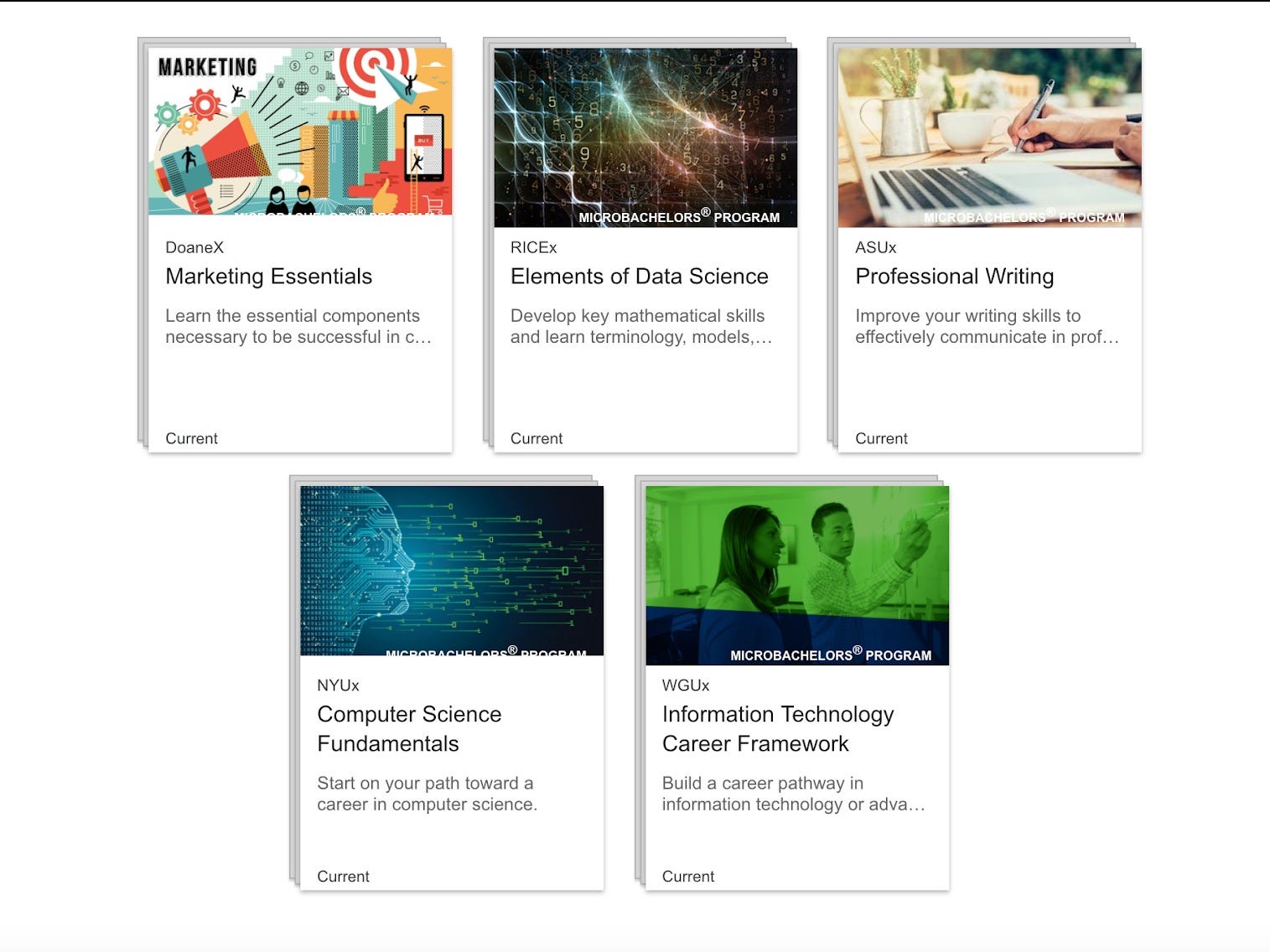- edX MicroBachelors are relatively affordable ($450 to $1,500), bite-sized versions of an undergraduate bachelor’s degree program.
- Students earn real, transferable college credits for completing them online, so they can build towards a full bachelor’s degree or show they’re credentialed to employers.
- The programs are designed to help students build marketable skills and were created using insights from Fortune 1000 companies to encompass skills currently needed in the workforce.
- You can find answers to FAQs about edX MicroBachelors programs below.
- Read more: Coursera’s new annual subscription, Coursera Plus, grants members unlimited access to over 90% of its online classes for $399 a year
Table of Contents
edX, a nonprofit created by Harvard and MIT, has inventive and flexible online education offerings that are finding newfound traction in the absence of many modes of traditional in-person education.
For instance, edX offers affordable, mini versions of undergraduate and graduate courses and programs. You can take a portion of a bachelor’s or master’s degree online and, in exchange, earn real, transferable credits.
Both edX's MicroBachelors and MicroMasters programs are entirely online and a fraction of the traditional cost of higher education credits. Students can use them as standalone qualifications on resumes and portfolios or as stackable stepping stones towards a full degree.
The MicroBachelors programs were created by universities like NYU, Arizona State University, Rice University, and more in topics like marketing essentials, elements of data science, professional writing, computer science fundamentals, and information technology career framework.
These initial programs were influenced by job force data and input from Fortune 1000 companies to help students to exit programs job-ready and credentialed. The company has plans to launch an advisory council of foundations, academic institutions, and corporations to identify the core skills and learning pathways MicroBachelors should address.
edX also partners with major businesses to offer MicroBachelors to employees to help upskill their workforce and create pathways for career advancement.
You can learn more about the MicroMasters here, and more about the MicroBachelors below.
Do you get actual college credit with an edX MicroBachelors?
Yes, once you've completed it. Each program comes with real, transferable college credit from one of edX's university credit partners. If you combine them with previous credits you've already completed or future credits, a MicroBachelors program can help you get closer to achieving a full bachelor's degree.
How does the credit work, and where does it come from?
Once you successfully complete a MicroBachelors program, you'll have the option to elect academic credit from colleges and universities that have reviewed the program and have agreed to grant credit to students who've completed it - without any additional fees or hoops to jump through.
But, it's worth noting that the academic institution that designed the program you're taking is not necessarily the institution that will grant credit for completing it. For instance, students who complete the MicroBachelors Program in Computer Science Fundamentals by NYU are only able to select transferable college credit from Thomas Edison State University.
Where are you technically enrolled as a student?
You're not technically enrolled as a student anywhere until you complete the program. Once you do, and you select credit from a credit provider, you become a student at that institution.
How much does it cost compared to a traditional undergraduate program?
According to edX, one credit costs $166 on average in its MicroBachelors program, compared to $308 for a nonprofit online college and $594 for a traditional undergraduate credit.
How long does it take to complete a MicroBachelors program?
The programs vary in length and are self-paced, so it depends on you and the program. But, a program with 6 credits should take between two to four months to complete.
Do you need a high school diploma or GED to enroll?
If you're enrolling in a MicroBachelors program to get real, transferable academic credit, it's important to note that in order to do so you'll need to confirm you've received a high school diploma, GED, or high school equivalency.
If you're taking the MicroBachelors to learn or demonstrate an aptitude in marketable skills, you can take classes and earn a program certificate without a GED, high school diploma, or equivalent.
Do you need any previous college credit to enroll in a MicroBachelors program?
No. It can be your first undergraduate experience. Later, you can continue with edX's credit providers or transfer the credits you've earned to a school of your choice.
Do you need to apply for an edX MicroBachelors like a traditional undergraduate program?
No. There's no application or decision process for admissions.
Does edX offer financial aid or other ways to get help paying for a MicroBachelors program?
Yes, edX offers financial aid to learners who demonstrate that "paying the verified certificate fee would cause economic hardship" according to the company's website. Enroll in the course as an audit (unpaid) learner, and then complete the financial assistance application. You can apply for financial assistance here, and you should hear back within two to four business days. If accepted, you'll receive a code for 90% off.
If you're employed and your employer has an educational benefit program, it's worth checking to see if the MicroBachelors could be eligible for reimbursement since it's credit-bearing.
